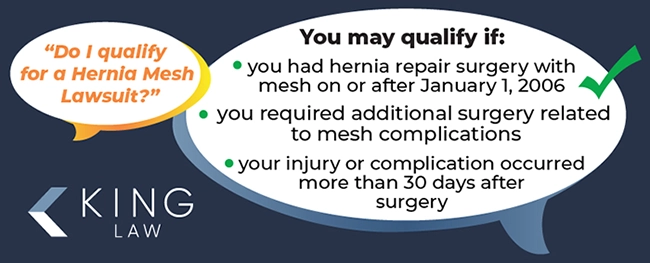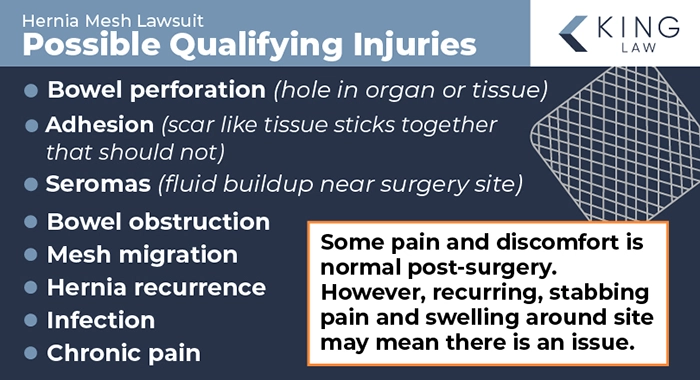Do You Qualify for a Hernia Mesh Lawsuit?
If you had hernia repair surgery with mesh on or after January 1, 2006, you may qualify for a hernia mesh lawsuit. It is important to discuss your case with an attorney to determine your eligibility. Generally, individuals who suffer serious post-surgery injuries qualify. Injuries may include adhesions, hernia recurrence, intestinal blockage, mesh migration, organ perforation, or infection that occurred more than 30 days after the surgery.
Patients who require hernia revision or another type of corrective surgery related to complications with the initial repair are strongly encouraged to pursue legal action. If you had mesh implanted that was made by Ethicon, Atrium, Covidien, or Bard Davol, you might qualify. It is important to identify the brand and manufacturer of the mesh implant and to know the dates of your initial hernia mesh surgery, as well as any revision surgeries.
A qualified attorney can walk you through the process and help you obtain the necessary evidence to prove your case.

Table of Contents:
How to Qualify for a Hernia Mesh Lawsuit
Hernia Mesh Complications Linked to Eligibility in Lawsuits
Evidence to Qualify for a Hernia Mesh Lawsuit
Hernia Mesh Statute of Limitations and Lawsuit Timeline
Hernia Mesh Settlement Amounts
Step-by-Step Guide: How to Determine Your Eligibility
How to Qualify for a Hernia Mesh Lawsuit
If you suffered serious injury or had to have revision surgery after your hernia mesh implant, you may qualify to file a lawsuit. It is imperative to work with an attorney as soon as possible to determine whether you have a valid claim for damages.
Qualification criteria for hernia mesh lawsuit:
- Verify hernia repair surgery date. The hernia repair surgery with mesh must have occurred on or after January 1, 2006.
- Confirm the type of complications suffered. While any post-surgery complication should be taken seriously, not all injuries will qualify. To be eligible, you must have suffered a severe complication such as adhesions, hernia recurrence, intestinal blockage, or mesh migration at least 30 days post-surgery.
- Check if you had hernia revision surgery. If you required hernia revision surgery or another type of surgery as a result of your complications, you may qualify.
- Determine the manufacturer. Check your medical records to determine who manufactured the mesh. Qualifying manufacturers include Ethicon, Atrium, Covidien, and Bard Davol.
- Provide a medical professional’s recommendations. If you received a medical professional’s recommendation that you should schedule an additional surgery due to complications with the surgical mesh implant, you may be able to file a lawsuit. Be sure to provide your medical records showing the recommendation or the scheduled surgery. You may also be eligible if the surgery was recommended but not possible due to medical issues.
- Preserve evidence. If a revision surgery needs to be performed, ask that the removed hernia mesh be preserved pursuant to a court order issued in 2018.
- Consult with a lawyer. Contact a hernia mesh lawsuit attorney to discuss your rights. Be sure to provide the specifics of your case, including the hospital where it was performed, your doctor’s name, the type of medical condition suffered, the dates of any surgeries, and the first time you noticed complications.
You can also report any problems with your surgical mesh surgery to the U.S. Food and Drug Administration (FDA). Reporting adverse events to the FDA can help to ensure that manufacturers are held accountable.
Eligibility Exclusions to Consider
While many patients who had hernia mesh installed may be able to file a lawsuit, there are some exclusions. It is essential to discuss your case with a hernia mesh lawsuit attorney to determine if there are any exclusions that may apply to your case or that may deem you ineligible to take legal action.
Eligibility exclusions in hernia mesh lawsuits:
- Your surgery occurred prior to January 1, 2006.
- You did not suffer a qualifying injury.
- The mesh installed was not manufactured by a qualifying manufacturer.
- The injuries you experienced occurred less than 30 days post-surgery.
The best way to determine whether you qualify for a hernia mesh lawsuit is by consulting with a personal injury lawyer.
Hernia Mesh Complications Linked to Eligibility in Lawsuits
Over the past several years, an increasing number of patients have reported complications with their hernia mesh surgeries. Complications range in severity from relatively minor to severe, including mesh migration requiring corrective surgery.
Hernia mesh complications that may qualify for a lawsuit:
- Infection
- Organ perforation
- Mesh migration
- Bowel obstruction
- Hernia recurrence
- Adhesion to internal tissues
- Chronic pain
- Fluid buildup near surgery site (seromas)
While these complications are severe, there are some less common but significant problems that individuals have reported. Less common complications include bleeding, organ damage, and abscesses.

Evidence to Qualify for a Hernia Mesh Lawsuit
In order to qualify for a hernia mesh lawsuit, it is critical to provide evidence regarding your initial implant surgery and any complications. A hernia mesh lawsuit attorney can help you obtain evidence if you are unable to collect it on your own.
Evidence that may support your hernia mesh lawsuit:
- Medical records – You will need to provide a copy of all medical records related to your initial hernia mesh implant surgery and any follow-up visits.
- Imaging studies – Imaging studies like X-rays or MRIs may prove essential in your case. They can often show migration and other complications that may have occurred as a result of your implant.
- Expert testimony – Given the complexities of hernia mesh implantation surgeries and any related complications, it is generally necessary to obtain expert testimony. A medical expert can help to verify your damages.
- Personal records – Personal records such as pain diaries can help substantiate your claims. Witness testimonies from acquaintances and financial records documenting your losses may also help.
- Photographic evidence – Any photographic evidence related to your case may aid in proving your claim.
Evidence can be used to prove your complications, the type of mesh that was implanted, or recommendations made by your surgical team related to your injuries.
Hernia Mesh Statute of Limitations and Lawsuit Timeline
A statute of limitations is a legal time limit on the amount of time you have to file a lawsuit. It varies by state and lawsuit type. If you fail to take legal action within the statute of limitations, your claim may be dismissed. Even valid claims will be denied if they fall outside of the legal time limit.
In some jurisdictions, the time limit starts when the injury is discovered, not when it occurs. Known as the discovery rule, it may allow you to file a claim beyond the normal statute of limitations in your state if you did not or could not have reasonably discovered the injury. Some states also have statutes of repose that may limit the amount of time you have to file a lawsuit. It is important to discuss your case with an attorney to determine if the timeline began when the harm was discovered, when the mesh was initially installed, or when it was manufactured, sold, or left the manufacturer.
Generally, you will have between 1 and 6 years from the date of the injury, depending on the state. The statute of limitations may also be paused if you were a minor at the time of the injury, in a coma, or incarcerated. The time limit may also be extended if the manufacturer knew of the risks but failed to warn consumers.
Hernia Mesh Settlement Amounts
Hernia mesh settlement amounts vary depending on a number of factors, including eligibility, the quality of evidence, and other relevant considerations. Stronger evidence and clear eligibility can lead to higher settlements. It is estimated that hernia mesh settlements will range between $65,000 and $85,000 on average. There is, however, a potential for higher settlements. In some cases, the settlements may reach as high as $1 million.
The amount that an individual could receive in a hernia mesh lawsuit may also depend on the type of case that they file. An individual plaintiff’s settlement will depend on the specifics of their situation. Plaintiffs in a class-action lawsuit may receive legal funds, but they could be less than the amount projected in the estimated typical settlement range.
Step-by-Step Guide: How to Determine Your Eligibility
The best way to determine your eligibility for a hernia mesh lawsuit is by contacting a qualified attorney. An attorney can walk you through the legal process to determine whether you have a valid claim for damages.
Step-by-step eligibility determination in a hernia mesh lawsuit:
- Review Medical History: Confirm your hernia mesh surgery date (must be on or after January 1, 2006) and identify any post-surgery complications like adhesions, hernia recurrence, or infections.
- Gather Documentation: Collect all relevant medical records, including details of the type of hernia mesh used, records of any subsequent surgeries due to complications, and any medical evidence of injury.
- Research Hernia Mesh Manufacturer: Determine the manufacturer of your hernia mesh implant and check for any known issues or recalls associated with that brand.
- Verify Legal Timeframes: Research the statute of limitations for hernia mesh lawsuits in your state. Take into consideration any special rules like the discovery rule or statutes of repose.
- Consult with a hernia mesh lawsuit attorney. Seek advice from a lawyer experienced in hernia mesh lawsuits to evaluate your case details and guide you through the eligibility assessment process.

Contact a Hernia Mesh Lawyer Today
Did you suffer complications after a hernia mesh implant surgery? Contact King Law to determine your eligibility to file a hernia mesh lawsuit. Our lawyers have extensive experience handling medical-legal issues, including hernia mesh cases. Our years of practice help us to accurately assess whether your circumstances present a valid claim for damages. We will navigate the complexities of medical evidence and legal criteria to help determine your eligibility.

